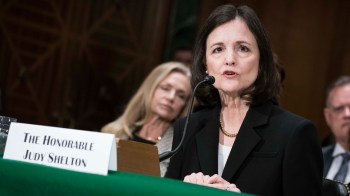Adriene Hill: The Iowa Caucuses are on Tuesday, and the race remains far from settled. New polling shows that Mitt Romney, former Massachusetts governor, is gaining ground.
As part of a series of conversations on our show about the candidates’ economic ideas, we’re going to talk Romney-onomics with Glen Johnson. He’s politics editor for Boston.com and joins us now. Good morning Glen.
Glen Johnson: Good morning to you.
Hill: So, Romney originally worked in the private sector as the head of Bain Capital — the private equity firm. And I wonder how that experience informed his economic views.
Johnson: A lot of people think about him as a successful businessman, a millionaire many times over. And that’s in fact what he’s basing his campaign on — his second run for the White House. But then he likes to not just focus on the money that he made, but also the jobs that he helped create in that capacity.
So, through his work at Bain Capital, he provided venture capital and support for a variety of companies — like Staples, the office supply store. A lot of the critics focus on companies like American Pad & Paper, where the companies ended up either going bankrupt or laying off huge numbers of people — or both.
Hill: And what about in the public sector? When he was the governor of Massachusetts, what did he accomplish on the economic front there?
Johnson: You’ve got to remember that at that time, the state was in a mini-recession. And so, a lot of what you saw was the sort of mechanics of him as a manager — he balanced the budget, tightened up some regulation, loosened some others.
He doesn’t talk as much about how he did increase a number of fees and things like that in the state. And so while he may not have done a direct tax cut, he did do revenue increases while he was governor as well.
Hill: Romney does talk a lot about the middle-class, but how in touch is he really with the middle-class?
Johnson: Well, I think in a classic sense a lot of people could question how in touch he is with the middle-class. He’s a real dichotomy in that he’s a millionaire many times over, but he’s also a very frugal person and hates to see money wasted.
Whether or not people buy that — people who are riding the bus, who are struggling to make ends meet — that’s going to be one of the points of contention should he be the Republican nominee.
Hill: Glen Johnson is politics editor for Boston.com. Thanks so much.
Johnson: You’re welcome.
There’s a lot happening in the world. Through it all, Marketplace is here for you.
You rely on Marketplace to break down the world’s events and tell you how it affects you in a fact-based, approachable way. We rely on your financial support to keep making that possible.
Your donation today powers the independent journalism that you rely on. For just $5/month, you can help sustain Marketplace so we can keep reporting on the things that matter to you.


















